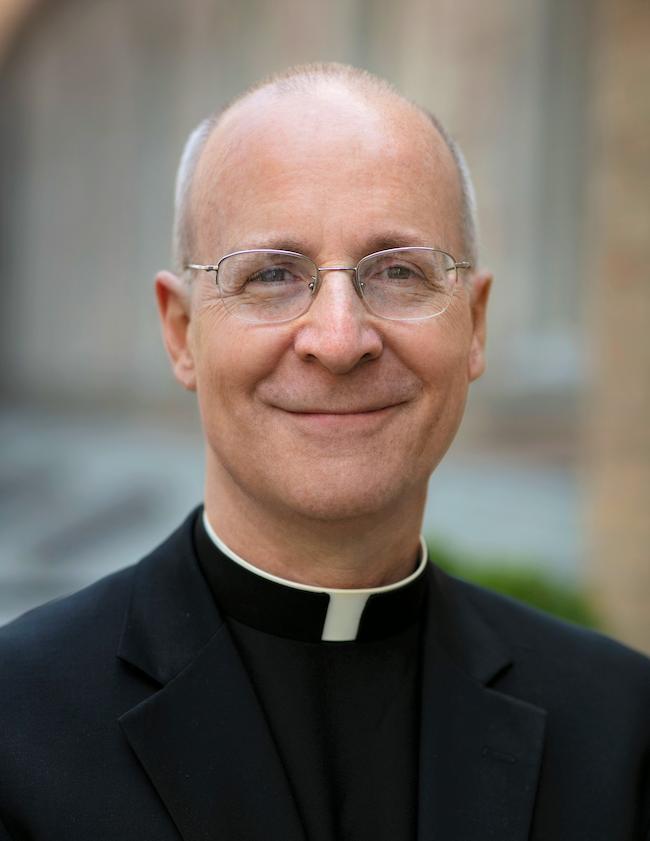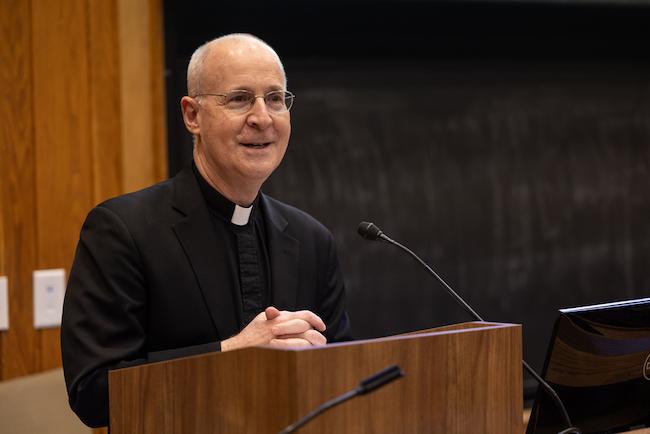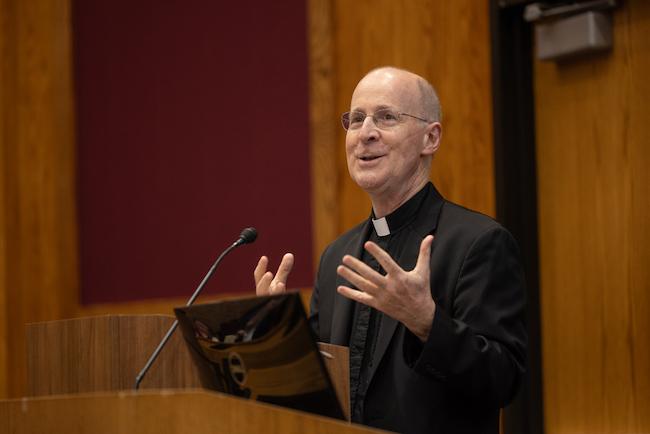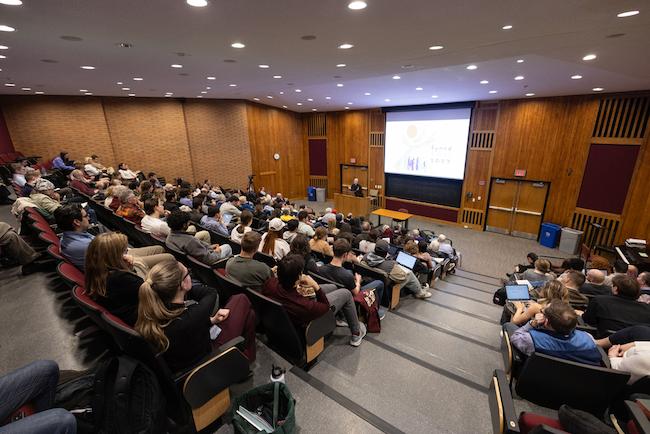What Happened at the Synod?
.jpg)
James Martin, S.J.
Author, Consultor to the Vatican’s Dicastery for Communication, and a member of the 2021-2024 Synod of Bishops
Date: Wednesday, April 10, 2024
Time: 5:30 - 7pm
Location: McGuinn Hall 121
BC Bookstore will be selling his latest book and Fr. Martin will be available to sign following his lecture.
The Synod on Synodality was said to have been the most important gathering in the Catholic Church since the Second Vatican Council. Fr. James Martin, SJ, a delegate to the Synod appointed by Pope Francis, will join us to share what happened, what didn't and what it all means.

The Rev. James Martin, S.J., is a Jesuit priest, author, editor at large at America, the national Catholic review, a Consultor to the Vatican’s Dicastery for Communication and a member of the 2021-2024 Synod of Bishops.
He received his master's degree in divinity (M.Div.) and his master's degree in theology (Th.M.) at the Weston Jesuit School of Theology (now the Boston College School of Theology and Ministry). Fr. Martin has received honorary Doctor of Divinity degrees (D.D.) from Regis College in Toronto and from Wagner College in New York. He has received over twenty honorary Doctor of Humane Letters degrees (D.Hum.) over the years, including degrees from Fordham University, Creighton University, and Loyola University of Maryland, to name a few.
Fr. Martin is the author and editor of over 20 books. Besides articles in Catholic publications like America, Commonweal, U.S. Catholic, Catholic Digest and The Tablet (London), Fr. Martin has written for, among others, The New York Times, The Wall Street Journal, The Boston Globe, The Chicago Tribune, The Philadelphia Inquirer, O Magazine and other newspapers and websites, including Slate, Time, CNN, The Huffington Post and The New York Times’s and The Washington Post’s websites. He has commented on religion and spirituality in the national and international media, and he has appeared on all the major radio and television networks, and in venues as diverse as National Public Radio's "Fresh Air with Terry Gross," NPR’s “Weekend Edition,” PBS’s “Newshour,” Comedy Central’s “The Colbert Report” and Fox News Channel's "The O'Reilly Factor," CBS’s “Late Show with Stephen Colbert,” as well as ABC, NBC, CBS, CNN, MSNBC, PBS, The History Channel, the BBC, National Geographic and Vatican Radio. He served as an expert commentator for ABC News during the 2013 papal conclave and during Pope Francis’s visit to the United States in 2015.
In 2023, he was named by Pope Francis as a Member of the Synod of Bishops, one of 70 “non bishops” appointed by the Holy Father as voting members.
Chillingworth, David. “The Church and Synodality.” International Journal for the Study of the Christian Church 23, no. 2 (2023): 121–34.
Jasper, William F. “Pope Francis' Revolution The Synod On Synodality: Pope Francis' Four-Year-Long Synod Is Sending Shockwaves Throughout the Catholic World as Its Radical Agenda on Moral Issues and Church Governance Becomes Known.” The New American (Belmont, MA) 39, no. 21 (2023): 22.
Martin, James. Awake My Soul: Contemporary Catholics on Traditional Devotions. Chicago, IL: Loyola Press, 2004.
_____. Building a Bridge: How the Catholic Church and the LGBT Community Can Enter into a Relationship of Respect, Compassion, and Sensitivity. New York, NY: HarperOne, an imprint of HarperCollinsPublishers, 2017.
_____. Come Forth: The Promise of Jesus's Greatest Miracle. New York, NY: HarperOne, an imprint of HarperCollinsPublishers, 2023.
(Note that this book is being sold at the BC bookstore and at the event.)
_____. Searching for God at Ground Zero: A Memoir. Lanham, MD: Sheed & Ward, 2002.
Sanem, Michael J. Your Church Wants to Hear from You: What Is the Synod on Synodality? Collegeville, MN: Liturgical Press, 2022.
White, Christopher. “Pope Launches Synod on Synodality.” National Catholic Reporter 58, no. 2 (2021): 1–6.
In her National Catholic Reporter article “Pope Sets up Groups to Study Most Controversial Issues Raised at Synod,” author Cindy Wooden provides a close look into the Pope’s assigned Synod study groups. These ten groups will examine some of the most contentious topics raised in the first Synod, and they will continue their work after the Synod’s final assembly. Topics include greater acceptance of LGBT+ Catholics, the possibility of ordaining women deacons, and engagement with the “digital environment.” This movement seems to offer a promising way forward for how the Church can continue conversations about difficult topics, both during and after the Synod.

Fr. James Martin delivering his lecture on "What Happened at the Synod?"


The audience's view of Fr. James Martin delivering his lecture on "What Happened at the Synod?"
Photo Credits: Christopher Soldt, MTS
On Wednesday, April 10, 2024, the Boisi Center hosted James Martin, S.J. for a lecture entitled “What Happened at the Synod?” Martin was a delegate at the 2021-2024 Synod of Bishops, and his lecture shared about the purpose, technique, impact, and future of the Synod process. Overall, Martin led a well-attended, informative conversation that gave the audience important insight into the discernment processes of the Catholic Church.
Martin began his lecture by discussing the history and aims of the Synod. Led by Pope Francis, the Synod intends to gather diverse voices in the Church and listen to the Holy Spirit in each individual. Martin explained how the process relies heavily on the Jesuit idea of discernment. He then discussed how the delegates were chosen, noting that dioceses selected the majority of bishops and lay people to attend. Pope Francis also selected 70 delegates; Martin was one of his selectees. Ultimately, the Synod included 350 delegates, 75% of whom were bishops. This Synod was revolutionary insofar as it included lay people and women for the first time, with over 50 women attending and having full voting rights. It was also revolutionary for the scale of its collaboration. The Synod produced a working document that represents the largest consultative gathering in history, meaning that the number of people consulted worldwide for the creation of the document represents the greatest of any writing in history.
After providing an overview of the Synod (complete with many illustrative photos from the event), Martin spent most of the evening engaging with commonly asked questions and questions from audience members. He shared how the delegates communicated at the Synod, explaining that they received a different topic to discuss each week and worked in small groups that were organized alphabetically, while also ensuring at least one woman was present in each group. He also shared that Pope Francis was available to converse with the delegates throughout the entirety of the Synod. Martin expressed his excitement for the diverse conversations that would shape the future of the Church, marveling at the fact that the Synod allowed a 22 year-old college student from St. Joe’s to engage in discourse with a Cardinal from the other side of the world.
During the Q&A, one audience member asked how we as a church can move forward after the Synod. Martin responded by asking for prayers for the Church and urging everyone to become ambassadors of the Synod and to dispel the many falsehoods about the event. When asked about the lasting effects of the Synod, Martin answered, noting that, “affective collegiality precedes effective collegiality.” In other words, the delegates were able to know one another and become friends, which lays a crucial foundation to deliberate on challenging conversations in the future. At the next meeting in October, Martin believes the discourse will be able to progress, as the delegates are now familiar with one another and have fostered meaningful relationships.
Martin closed the lecture by offering three words that encapsulated his experience: exciting, exhausting, and intense. Following these three words that concluded the event, Martin stayed to sign copies of his recently published book, Come Forth: The Promise of Jesus’s Greatest Miracle and to converse with students, professors, and community members.

